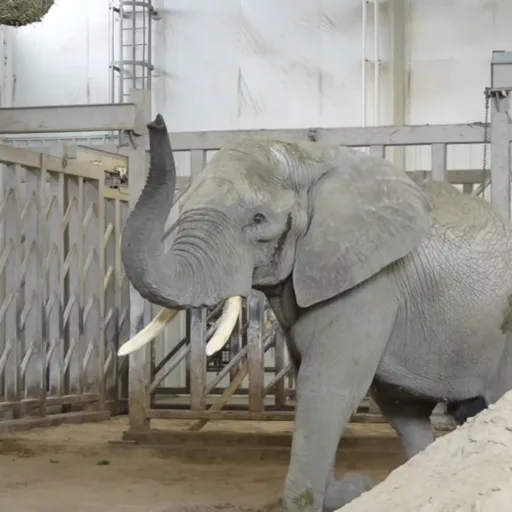
Callee
Sedgwick County Zoo (Wichita, KS)
Callee is an African elephant currently held at the Sedgwick County Zoo in Wichita, KS. He was born in captivity at the Pittsburgh Zoo in September 2000 to two elephants who were stolen from the wild and imported to the United States. Callee has spent his entire life housed in tiny, barren enclosures where he’s been forced to breed with mates he did not choose and subjected to invasive procedures to collect his semen. Any bonds he’s formed with other elephants have been severed every time he has been crated and trucked to other zoos.
Callee's Story
Callee is a male African elephant who was born on September 19, 2000 at the Pittsburgh Zoo, which continues to be steeped in controversy over its elephant program. The zoo had a long history of using bullhooks–a painful tool used to control elephants through fear–and used them on elephants while Callee was confined there.
Callee’s parents were captured from the wild and imported to the United States. His mother and father, Nan and Jack, are both held captive in Pennsylvania at non-AZA accredited facilities: Nan is confined at the Pittsburgh Zoo, while Jack is confined at the International Conservation Center. Both Nan and Jack have been forced to participate in captive breeding, and Callee has 11 living siblings who are held captive at zoos in Pennsylvania, Florida, and Kansas.
Callee has spent his entire life housed in tiny, barren enclosures where he’s been forced to breed with mates he did not choose and subjected to invasive procedures to collect his semen. Any bonds he’s formed with other elephants have been severed every time he has been crated and trucked to other zoos.
Callee endured two traumatic transfers by the time he was 18 years old. In 2011, when Callee was ten years old, the Pittsburgh Zoo separated him from his mother, his sister, and other elephants he grew up with by sending him to the Birmingham Zoo where he lived with other male elephants. The Pittsburgh Zoo attempted to justify the transfer by claiming that Callee was being shunned by the female elephants at the zoo. However, in the wild, males often begin to leave their natal herd between the ages of nine and 18, a complex process that can take anywhere from one to four years. In 2019, Callee was again torn from other elephants when he was transferred to Omaha’s Henry Doorly Zoo.
In Omaha, Callee was forced to breed with elephants recently imported from the wild in Eswatini. Callee fathered five elephants, the most recent being born in early 2024. Then in 2023, for the third time in his short life, Callee was separated from the elephants he had been confined with and crated and trucked to the Sedgwick County Zoo, which planned to use him for captive breeding. The bio of Callee published by the zoo details his “travels,” which completely misrepresents the transfers as mimicking normal bull behavior and obscures the harm that such transfers cause male elephants.
Callee has impregnated as many as four elephants since arriving at the Sedgwick County Zoo. It is only a matter of time until the AZA forces Callee, currently only 23 years old, to be transferred again to be exploited for his genetic material.
Callee is a prisoner whom the AZA has treated as a “thing,” forced to breed and create a new generation of imprisoned elephants–despite the physical and psychological trauma caused by such practices as well as the harms of zoo captivity and repeated transfers. Callee has never been given the opportunity to form lasting, life-long bonds with any elephant. His undignified life is undeniably cruel, and his story highlights the lack of conservational value with captive breeding programs, which exist solely to forcibly create a new generation of elephants to hold captive and exploit for profit.
May Callee, his parents, his siblings, and his offspring one day find refuge at accredited elephant sanctuaries where they can finally enjoy, in environments capable of meeting their complex physical and psychological needs, the right to freedom.
Take action today
A future where no elephant has to endure the traumas of being torn from their families and natural habitats, bred against their will, and shipped from zoo to zoo is possible, and we need your help to make it a reality.
Submit Information
Do you have a tip for us? The Free to be Elephants project relies on our supporters to keep us up-to-date with the latest news, updates and photos about elephants in their local facilities. Use this form to submit your info and help us expose the reality of elephant captivity across America.